Free home visits
with a local audiologist

Hearing aid batteries are small, cylindrical batteries that are used to power hearing aids. They come in a range of sizes and types, providing power to your digital hearing aids and assisting your everyday hearing needs. Therefore it is important to choose the right battery for your specific hearing aid.
Here we talk about everything you need to know regarding hearing aid batteries. Such as size, lifespan, storage, brands, where to buy, and common questions we get asked by our patients. We hope that this content will help you decide which battery type will benefit you most
No, they are all different, similar to regular household batteries you can buy various brands of hearing aid batteries in different sizes. Behind-the-ear (BTE) hearing aid styles historically use size 13 and 312 batteries. Whereas, In-the-ear (ITE) hearing aids usually use size 312 or 10 batteries.
To make it easier, each size has an industry-standard colour code, which we have highlighted below.
The most popular brands are Rayovac hearing aid batteries, Duracell hearing aid batteries, Energizer, and Power One hearing aid batteries. Hearing aid manufacturers also make their hearing aid batteries and usually provide around a month's supply when you initially purchase your hearing aids.
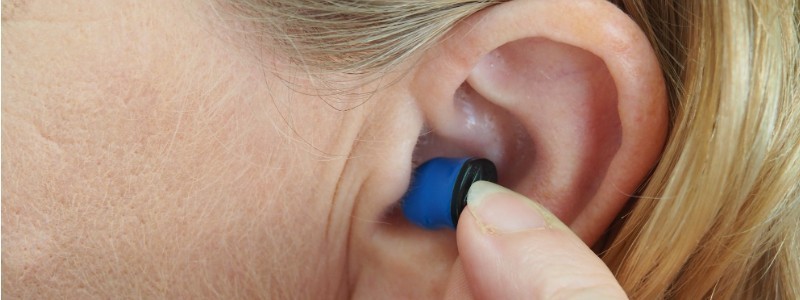
Hearing aids battery types available are getting smaller, more advanced, and more powerful than those of the past - whether they are powered on standard batteries or rechargeable versions. Rechargeable batteries need to be charged fairly regularly and standard batteries are disposable and need to be replaced. Rechargeable batteries are usually charged up at night when the wearer takes them out to sleep.
Historically, the main types of hearing aid batteries are zinc-carbon batteries, which are made from a combination of zinc and carbon. These batteries are inexpensive and widely available, but they have a shorter lifespan than other types of batteries and may not be suitable for use in advanced hearing aids that require a higher level of power.
Now zinc-air batteries are commonplace, as they are more eco-friendly and maintain reliable voltage. These use oxygen from the air as an electrolyte. These batteries have a longer lifespan than zinc-carbon batteries and can provide more power, making them a good choice for advanced hearing aids. However, they can be more expensive and may be more difficult to find in some areas.
There are also rechargeable hearing aid batteries, which can be convenient for users who do not want to constantly replace disposable batteries. These batteries can be charged using a specialised charging unit and may be suitable for use in both traditional and advanced hearing aids.
However, they can be more expensive upfront and may require more maintenance to ensure that they are properly charged and ready for use.
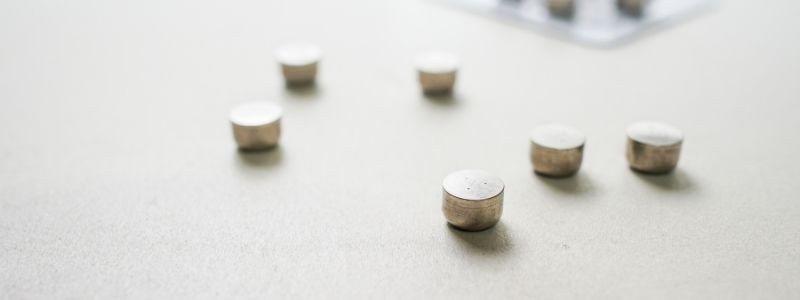
Although battery sizes are standardised to fit pretty much all hearing aid models and brands worldwide, hearing aid batteries do come in different sizes. These are denoted by a number and colour code. The most common size hearing aid batteries are 10, 13, 312, and 675.
The size you need will depend on the size of your hearing aid. Your hearing aid manufacturer or audiologist can tell you which size you need.
Hearing aid colour and style guide to tell the sizes apart: hearing aid batteries have coloured stickers on them and the same colour will be on the pack, so they are easily recognised. This will also indicate the average life span of the batteries and their usage.
Hearing Aid Battery Number | Hearing Aid Battery Size(mm) | Average Lifespan* of Hearing Aid Batteries | Hearing Aid Battery Tabs & Sticker Colours | Extra Hearing Aid Battery Information |
| Hearing aid batteries 10/10A | 5.8 mm x 3.6 mm | 3-7 days | YELLOW | Smallest hearing aid battery |
| Hearing aid batteries 312 | 7.9 mm x 3.6 mm | 3-10 days | BROWN | Half the thickness of the size 13, standard hearing aid size |
| Hearing aid batteries 13 | 7.9 mm x 5.4 mm | 6-14 days | ORANGE | Hearing aid battery most likely to be used by the NHS |
| Hearing aid batteries 675 | 11.6 mm x 5.4 mm | 9-20 days | LIGHT BLUE | Largest hearing aid battery for most powerful hearing aids |
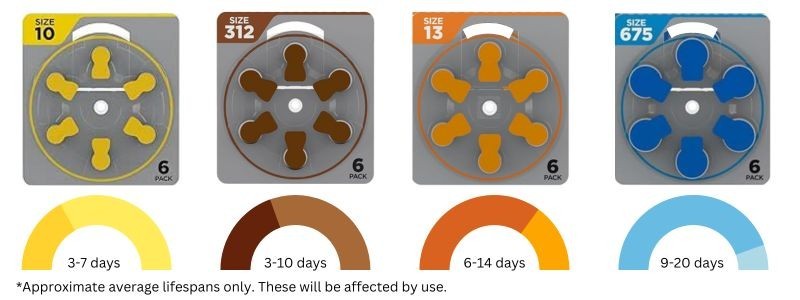
*As listed in the table above, the hearing aid battery lifespan will also depend on your usage and streaming. Generally, the trend is, that the smaller the battery the shorter the lifespan. If, out of the blue, your hearing aid battery life is shortened, there might be an issue with your hearing aids.
If this happens, read your manufacturer's user manual for reference and if you need extra support contact your audiologist who will give both aids a full maintenance check and repair if needed.
Regardless of the type of hearing aid battery your hearing aids require, it is important to follow the manufacturer's instructions for use and to replace the battery when it is no longer providing sufficient power. It is also a good idea to keep a supply of spare batteries on hand in case of emergencies.
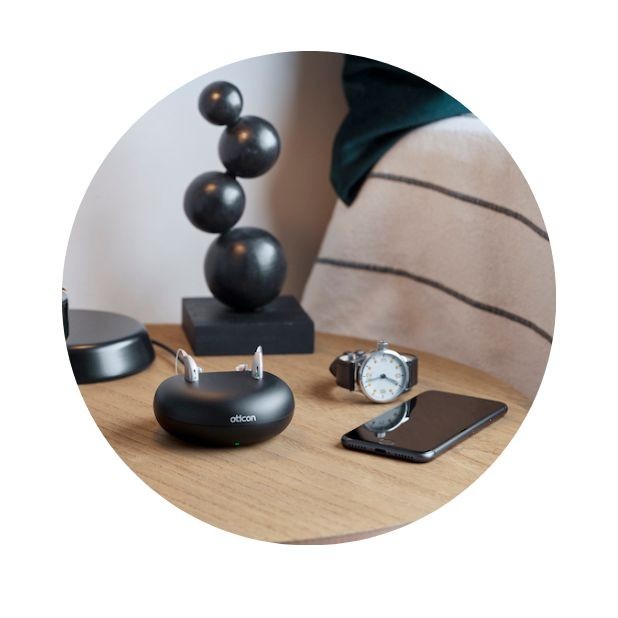
Hearing aids don’t always have to use standard batteries or disposable batteries, there are rechargeable versions available – so they can be recharged.
These are simply called rechargeable hearing aid batteries or lithium-ion batteries and pretty much all hearing aid brands have these as an option in their device ranges.
With rechargeable hearing aid batteries, you don’t have to buy new batteries when your old ones run out of power. You just recharge them and go! Rechargeable batteries should last as long as the life of your hearing aids.
The price of hearing aid batteries varies depending on what brand you go for and sometimes what size you need. You must invest in ones that are long-lasting and high-performance - so you will ways have the confidence that they can deliver reliable power throughout your day.
At publication, the average you will pay for batteries is around £2.00 for a pack of six mercury-free zinc-air batteries.

Are hearing aid batteries recyclable? Yes, they are, however, most consumers choose to buy the rechargeable version of the modern hearing aids on the market, as they are more eco-friendly and more convenient.
However, those who wear hearing aids that require standard batteries need to recycle them correctly and not dispose of them with everyday rubbish.
Recycling hearing aid batteries: Most local supermarkets now have battery recycling points for the disposal of hearing aid batteries and household ones too.
If you are upgrading and looking to donate your hearing aids, it is always good to remember that various charities will recycle and recondition your devices.
As each case of hearing loss and the patient's situation is unique, the best course of action is to discuss with your audiologist the type of batteries and brands of batteries that are best for you and your hearing aid device, and whether rechargeable hearing aids would be suitable for your needs.
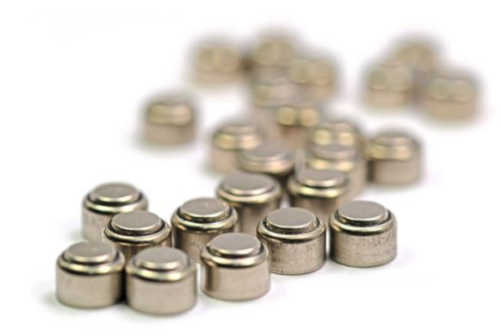
So, do hearing aid batteries expire? Rechargeable batteries need to be charged fairly regularly and standard batteries are disposable and need to be replaced. Rechargeable hearing aid batteries have a shelf life too but are generally the same as the device itself - roughly 4-5years.
If the battery compartment in your hearing aid doesn’t have a door, then it has a lithium-ion rechargeable battery inside. This means that these batteries take about 3-4 hours to fully charge and can usually last you around 24 hours.
Are hearing aid batteries free on the NHS? The simple answer is yes, you can get free hearing aids, free NHS hearing aid batteries, and repairs from the NHS. However, this is only the case if you have and currently wear NHS hearing aids.
You can obtain them from your local GP, or they can send them out to you by post. NHS hearing aids, as standard, are free of charge (on a loan basis) and currently come with a selection of free batteries. You can also contact your local NHS Audiology Department to order more or request that they post them out to you every month.
For all generic and standard hearing aid batteries, it depends on the type of hearing aid that needs powering and its overall capacity, how often you are wearing your hearing aids, and how much you stream via Bluetooth connectivity. This is also a similar case for rechargeable hearing aids.
If you stream a lot, you will be recharging your batteries more regularly. But there are some nifty and discrete charging pods out there that you can easily take out with you and charge on the go. Some manufacturers have 'quick charge' options for when you need it most and need a power boost urgently.
When it's time to replace the battery in your hearing aid, it's a good idea to have a few extra on hand so you always have a fresh one when you need it. Changing the battery is a simple process, and most hearing aids have a small door that opens to allow you to easily change the battery.
Generally, Zinc-carbon batteries typically last from 4 to 14 days, while rechargeable batteries can last from 4 to 7 days on a single charge.
Your pack of disposable zinc-air batteries will be fine for around three years if you always store them at room temperature. If you put your hearing aids in a fridge or a cold place, they can develop condensation under the battery's sticker within the packaging. You are then at risk of greatly reducing the battery's life span.
It is important to store hearing aid batteries properly to ensure they last as long as possible. Store them in a cool, dry place and keep them away from metal objects. If you're not going to use your hearing aid for an extended period of time, remove the battery to prevent leakage.
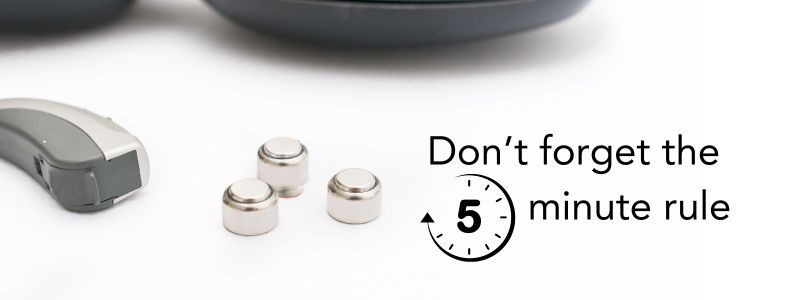
To maximise the lifespan of your hearing aid batteries, it is important to handle them carefully and store them in a cool, dry place. It is also a good idea to clean the battery compartment of your hearing aid regularly to remove any dirt or debris that may affect the battery's performance. The below advice will help you get the most out of your hearing aid batteries.
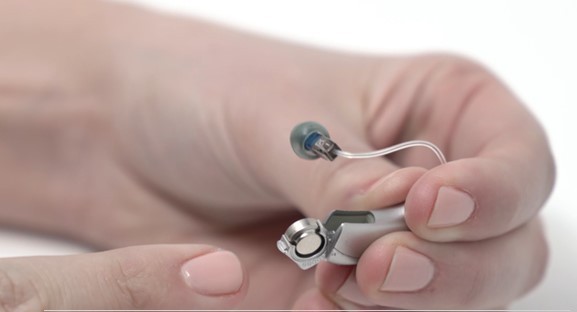
Private hearing aid wearers can get hearing aid batteries from their own local audiologist in the clinic, or they can post them out to you at your convenience. A lot of people do have a standing order for batteries, which delivers hearing aids automatically when they need them.
This seems to be a popular choice, as you don't have to remember to order then or worry that you'll suddenly run out and are left with hearing aids with no power and, therefore, no assisted hearing. You can also source various hearing aid battery brands from online retailers.
You can receive free hearing aid batteries from the NHS if you have NHS hearing aids. However, if you don't you will need to purchase hearing aid batteries either online or through your audiologist. Most manufacturers do send free hearing aid batteries when you first purchase your new hearing aids with them, but this is not the case for all in the industry.
In general, our attitude towards the environment is shifting and we are slowly becoming more eco-conscious. This is a positive leap in the right direction, as we become more sensitive to the environment each year. We are reacting to world problems such as climate change and making more conscious decisions in the way we purchase and dispose of certain products.
There has been a definitive shift in the way we want to live our lives, as we take stock and look at more rechargeability options - such as hearing aids. We believe the future to be eco-smart and thoughtful, with fewer batteries going into our landfills.
In a world where convenience is key, we don’t think the consumer attraction for this will change as portable recharging pods continue to become smaller providing handy on-the-go charging.
However, if you do have hearing aids that require hearing aid batteries, we advise that you purchase replacements from your audiologist or private healthcare provider. In reality, they go through their battery stock quickly, which means you will be purchasing more fresh batteries than maybe from an online retailer.
They will also give you the right advice about battery size, brands, and maintenance tips - so you will always benefit from the right hearing aid battery.
If you are looking for own-brand batteries such as Boots hearing aid batteries, Specsavers hearing aid batteries, or Amplifon hearing aid batteries - you'll need to contact those hearing aid providers to organise hearing aid battery purchases.
►Hearing aid maintenance at home
►How to get used to your hearing aids
►Click here to go back to the top of the page
Hearing aid batteries are a crucial component of any hearing aid and are necessary for ensuring that the device is functioning properly.
There are a range of options available, including zinc-carbon, zinc-air, and rechargeable batteries, and it is important to choose the right battery for your specific hearing aid and needs.
Contact your local audiologist for hearing aid battery support. Or call us free on 0800 567 7721 to benefit from hearing healthcare advice, and more information on upgrading your existing hearing aids or rechargeable hearing aid options available on the market today.
Do not spend hundreds of pounds without getting a second opinion from us.
 Not only are the prices great, but the service is fantastic! Many thanks to your team.
Not only are the prices great, but the service is fantastic! Many thanks to your team.A hearing aid uses on average about one battery per week and you need one hearing aid battery per hearing aid. Some hearing aids with very small batteries may only provide 4 days of use whereas ones with larger batteries may last up to 2 weeks.
You can receive free hearing aid batteries from the NHS if you have NHS hearing aids. However, if you don't you will need to purchase hearing aid batteries either online or through your audiologist. Most manufacturers do send free hearing aid batteries when you first purchase your new hearing aids with them, but this is not the case for all in the industry.
Your pack of disposable batteries will be fine for around three years if you always store them at room temperature. If you put your hearing aids in a fridge or in a cold place, they can develop condensation under the battery's sticker within the packaging. You are then at risk of greatly reducing the battery's life span.
When we refer to a product as 'Latest Launch', we mean it is the latest to be released on the market.
When we refer to a product as 'New', we mean that the product is the newest hearing aid model on the market.
When we refer to a product as 'Superseded', we mean that there is a newer range available which replaces and improves on this product.
When we refer to a product as an 'Older Model', we mean that it is has been superseded by at least two more recent hearing aid ranges.